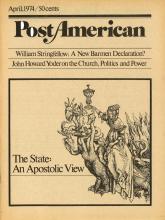The love of a sovereign God drives us into concern for the social order. The shape of that concern is at least partly a critical one. God does not simply tell us to accept the existing order. The bindingness and the vitality of our concern for the shape of society will be fed at more than one stream within the salvation story:
To affirm God as a loving creator, the earth as our home to be stewarded, and the life of our neighbor as entrusted to us is one way to say it;
To affirm the covenant with Noah, with its divine protection of life, was a promise of the seasons as the structure of cultural life and divine protection of blood as the presence of personal life is another;
To affirm the covenant with Abraham with its call to faith and its promise of a blessing for all the nations. It is still another;
To affirm the Mosaic covenant whose Torah is an abiding testimony to the wholeness of God’s concern for the shape of the life of his subjects is another;
To recount the Hebrew history with its repeated rhythms of obedience and disobedience, temptation and renewal, is yet another;
To respond in faith to the Kingdom proclamation of Jesus as reordering of the relationships of those who hear and follow him, and potentially of others as well, is still another;
To recount in faith the story of the apostolic missionary community as it spread a new life style across the Mediterranean world is another;
To proclaim the hope of a new city whose builder and maker is God, where a tree grows whose leaves are for the healing of the nations, is yet another;
All of these drive us into active social concern.
Few of us would declare there must be but one way of stating the mandate for Christian social concern, in only one verbal form.
Read the Full Article

